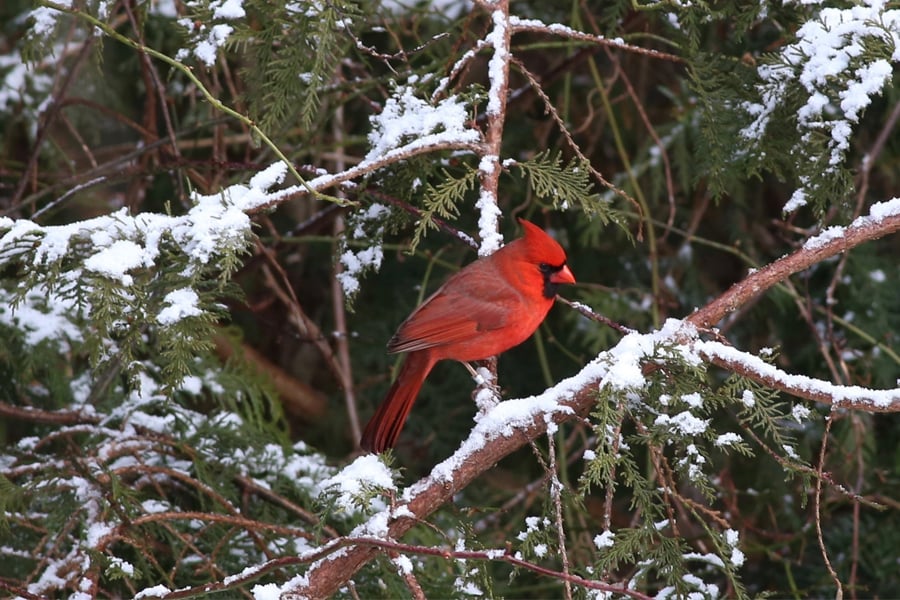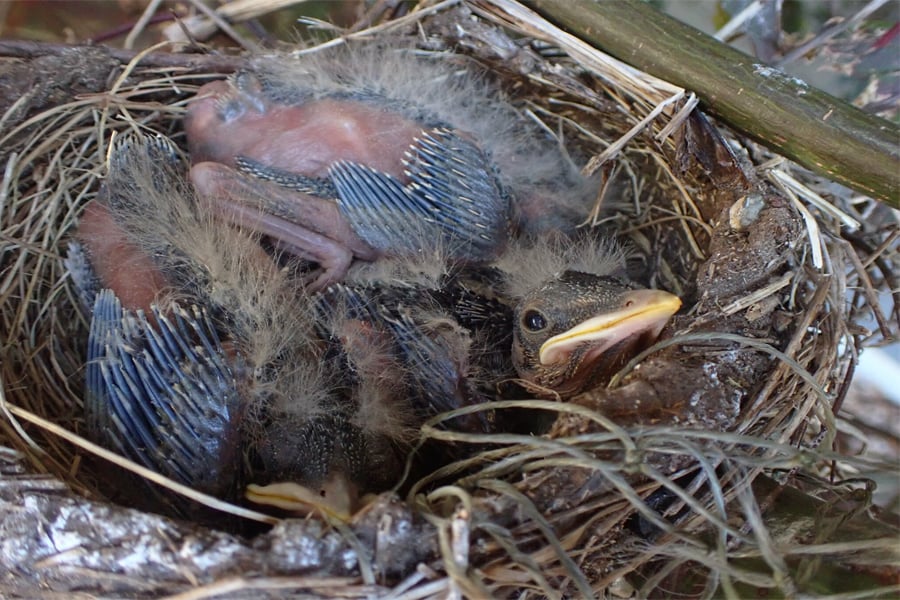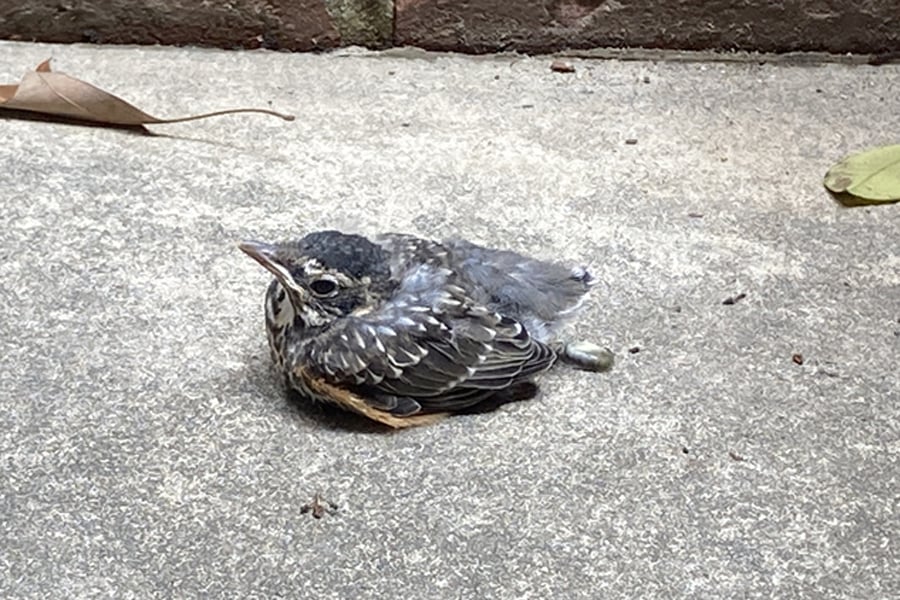Living With Songbirds
This page provides problem-solving advice and ways to make your yard and home less attractive to songbirds in the first place.

If You Find a Baby Bird
It’s always best for parents to raise their young in the natural environment. Unlike humans, songbirds and other young wild animals are not constantly supervised by their parents. They spend much of their time alone or with siblings. Because they learn how to find food and shelter and recognize and avoid predators from their parents, people should leave them alone when possible.
If you find a nestling on the ground, find the nest and place it inside. Birds have a poor sense of smell, so adults will not abandon their young if you touch them.
If you find a bird on the ground with most of its feathers that looks healthy but is unable to fly, leave it alone and watch from a distance for its parents. It's a fledgling, an older bird that can't fly but can perch and hop around. If you must move it, place it in a bush or low tree a few feet from where you found it. Do not move it from general area; the parents are most likely watching nearby.
Depending on the species, fledglings live on the ground for about two weeks. While they’re learning to fly, their parents feed and care for them and teach them how to protect themselves from predators. During this time, the parents may swoop by or squawk at people and animals that get too close.

Far from abandoned, these nestling robins are waiting for their parents to return with food.

Fledglings such as this American robin can spend up to two weeks on low branches and on the ground before they learn to fly.
How to Replace a Nest
If the nest is too high or cannot be found, you can make a replacement out of a hanging planter or plastic container. Here’s how!
- Only use a container that has drainage holes on the bottom.
- Line the container with natural materials, such as remnants from the old nest, grass clippings or dry leaves.
- If you are using a plastic container, poke four holes on the sides. Take four pieces of strong string, twine or rope, and tie one end of each through each hole. Tie the four remaining ends together, making a hanging basket.
- Place fallen eggs or nestlings in the makeshift nest. If the container is large, first place the birds in a smaller container, such as a yogurt or butter container, and then place it inside the larger lined one.
- If you can see the old nest but can’t reach it, place the replacement nest as close as possible, ideally within 10 feet. Birds locate their nests visually.
- If you cannot reach a branch, get a tall gardening shepherd’s hook, and hang your replacement from the hook.
- If the parents do not return within 24 hours, call Willowbrook Wildlife Center at 630-942-6200.
Flying Into Windows
Birds fly into windows for several reasons. They may see a reflection of the landscape, or they may see their own reflections and initiate territorial battles, which usually means nests are nearby. Millions die each year during migration alone, but there are ways you can help lower the number.
- Place brightly colored strips of material or curling ribbons on the outside of the window.
- Bend Post-its in an L shape, and place them on the outside of the window.
- Place black bird silhouettes on the window.
- Mark the window with soap, or place a bright light in the window to remove reflections.
- If a bird continually flies into a window, cover the entire outside with newspaper, and leave it up for five to seven days.
- If a bird is bleeding or has a fractured wing or leg or if its head is twisted around, bring it to Willowbrook Wildlife Center. If it only appears stunned, move it out of the sun or under a shrub. If after two hours it’s still unable to fly, bring it to the center.
Feeders
Young birds can become dependent on a feeder if it’s the only food they learn to use, so put feeders away April through October when natural foods are plentiful. Instead, plant flowers, shrubs and trees that produce seeds or fruits.
If you use a feeder, clean it regularly. Diseases such as house finch conjunctivitis, salmonellosis, aspergillosis, avian pox and avian trichomoniasis spread easily from bird to bird at feeders, and some can be fatal. Here’s how to properly clean one.
- Scrub the inside and outside of the feeder with a solution of one part bleach to 10 parts water.
- Rinse it thoroughly with clean water.
- Let it air dry outside. Make sure it’s completely dry before you refill it.
Cats & Songbirds
Each year, free-roaming cats — domestic as well as feral — kill millions of wild birds nationwide. Even declawed and well-fed cats are instinctively proficient hunters, so always keep cats indoors.
How to Make Your Home Less Attractive
- Stretch a Slinky or bird coil over ledges, roofs, window air conditioners or railings to discourage perching. You can also affix porcupine wire, which you can buy at local home centers.
- To discourage birds from building a nest in an unwanted area, play a radio nearby, or hang brightly colored streamers, strips of material, windsocks or curling ribbon.
- Put hardware cloth around dryer vents to keep birds from nesting or roosting inside.
What You Should Never Do
All native birds, a category that includes native songbirds, are protected by the 1918 Migratory Bird Treaty Act. It is illegal to:
- Possess birds, dead or alive, or their nesting materials, eggs, feathers or bones without proper permits from the U.S. Fish and Wildlife Service and the state of Illinois.
- Harm or kill a native bird.
- Remove or destroy nesting material once a bird has laid an egg.
- Move young from a nest.
The law does not protect nonnative pigeons (rock doves), English house sparrows or European starlings.